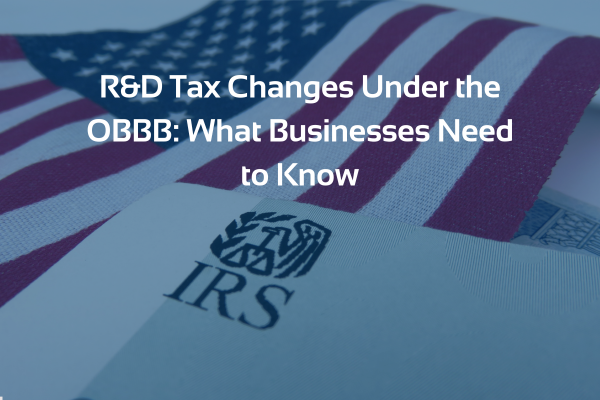
The One Big Beautiful Bill Act (OBBB), signed into law on July 4, 2025, brings significant changes to the tax treatment of Research and Development (R&D) expenses under Section 174 of the Internal Revenue Code (IRC). For businesses engaged in innovation, particularly in technology, biotech, and manufacturing, these changes offer substantial opportunities to optimize tax strategies and improve cash flow. As your trusted CPA firm, we’ve outlined the key R&D-related provisions of the OBBB and what they mean for your business.
Key R&D Tax Changes in the OBBB
1. Immediate R&D Expensing Restored
The OBBB reverses the Tax Cuts and Jobs Act (TCJA) requirement to capitalize and amortize domestic R&D expenses over five years. Starting with tax years beginning after December 31, 2024, businesses can once again fully deduct domestic R&D costs in the year they are paid or incurred. This permanent change eliminates the cash flow burden introduced in 2022, allowing companies to invest more in innovation without the delay of amortization.
What This Means for You: Immediate expensing enhances cash flow, particularly for R&D-intensive industries. Businesses can now plan with certainty, knowing this provision is permanent rather than a temporary reprieve.
2. Retroactive Relief for Small Businesses
For small businesses with average annual gross receipts under $31 million as defined under Section 448, the OBBB offers retroactive relief for tax years 2022–2024. You have two options:
- Deduct unamortized R&D expenses in 2025 or split evenly between 2025 and 2026.
- File amended returns for 2022–2024 to claim immediate deductions for previously capitalized R&D costs.
What This Means for You: Small businesses should weigh the administrative cost of filing amended returns against the benefit of waiting for the one- or two-year recovery period. Our team can help you analyze which option maximizes your tax savings.
3. Larger Businesses: Limited Retroactive Relief
While small businesses benefit from retroactive deductions, larger businesses not meeting the average annual gross receipts test are limited to deducting unamortized domestic R&D costs from 2022–2024 in 2025 or split evenly between 2025 and 2026. The OBBB does not provide retroactive expensing for larger entities for prior tax years.
What This Means for You: If you’re a larger business, you’ll still benefit from immediate expensing starting in 2025, but careful planning is needed to manage unamortized costs from prior years. We can assist in optimizing your recovery strategy.
4. Foreign R&D Costs Unchanged
The OBBB does not alter the TCJA’s rule requiring foreign-based R&D costs to be capitalized and amortized over 15 years. Businesses with international R&D operations should continue to account for this extended amortization period.
What This Means for You: If your R&D activities span multiple countries, ensure your accounting systems separate domestic and foreign costs to comply with these rules.
5. R&D Credit and Section 280C(c) Alignment
The OBBB restores the pre-TCJA interplay between Section 174 and Section 280C(c) by requiring businesses to reduce R&D expenses deducted by the amount of the R&D credit, unless an election is made under code section 280C(c)(2).
What This Means for You: This alignment simplifies R&D credit calculations. With an alternative available to elect out, our tax professionals can help you maximize both the credit and your deductions.
6. Permanent Change for Long-Term Planning
Unlike earlier proposals for a temporary five-year reprieve, the OBBB makes immediate R&D expensing permanent. This provides long-term certainty for businesses planning their R&D budgets.
What This Means for You: The permanence of this change allows for confident investment in innovation, knowing that tax benefits will remain consistent.
Additional Considerations
- State Tax Implications: Many states have not yet clarified how they will conform to the OBBB’s R&D changes. Some decoupled from the TCJA’s capitalization rules, while others adopted them. We’ll keep you updated on state-level guidance for Michigan to ensure compliance and optimize your state tax strategy.
- IRS Guidance Pending: The IRS is expected to issue procedural guidance on implementing retroactive deductions and recovery options. Our firm will monitor these developments to keep your business compliant.
- Who Benefits Most: Startups, tech companies, and manufacturers stand to gain significantly from improved cash flow and tax savings. However, all R&D-performing businesses can leverage these changes to fuel growth.
How MRPR Can Help
Navigating the OBBB’s R&D tax changes requires careful planning to maximize benefits and ensure compliance. Our experienced tax professionals can:
- Analyze whether filing amended returns or opting for the recovery period is best for your business.
- Optimize your R&D tax credit strategy in light of the restored Section 174 and 280C(c) interplay.
- Monitor state tax developments and IRS guidance to keep your business ahead of the curve.
- Provide tailored advice for separating domestic and foreign R&D costs.
Let’s Get Started
The OBBB’s R&D provisions are a game-changer for innovative businesses, offering immediate tax relief and long-term planning certainty. Contact MRPR today to schedule a consultation and learn how these changes can benefit your business.
Author:

Jordan Grant MST,EA Manager
